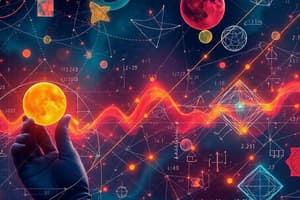Podcast
Questions and Answers
What is the main focus of arithmetic in mathematics?
What is the main focus of arithmetic in mathematics?
- Analyzing complex data sets
- Understanding continuous change
- Studying shapes and their properties
- Operations with numbers (correct)
Which of the following is a key concept in algebra?
Which of the following is a key concept in algebra?
- Solving equations with variables (correct)
- Graphing discrete data points
- Calculating area and perimeter
- Measuring standard deviation
What does calculus primarily study?
What does calculus primarily study?
- Properties of distinct objects
- Changes and rates of change (correct)
- Systems of linear equations
- Static shapes and their measurements
Which geometric shape has a fixed number of sides?
Which geometric shape has a fixed number of sides?
In statistics, what do measures of central tendency help determine?
In statistics, what do measures of central tendency help determine?
Which of the following is a concept included in discrete mathematics?
Which of the following is a concept included in discrete mathematics?
What is a derivative in the context of calculus?
What is a derivative in the context of calculus?
What is the role of probability in statistics?
What is the role of probability in statistics?
Flashcards
What is Mathematics?
What is Mathematics?
The study of numbers, quantities, shapes, and patterns.
What is Arithmetic?
What is Arithmetic?
The basic operations with numbers: addition, subtraction, multiplication, and division.
What is Algebra?
What is Algebra?
A branch of math using variables and equations to represent relationships and solve problems.
What is Geometry?
What is Geometry?
Signup and view all the flashcards
What is Calculus?
What is Calculus?
Signup and view all the flashcards
What is Statistics?
What is Statistics?
Signup and view all the flashcards
What is Discrete Mathematics?
What is Discrete Mathematics?
Signup and view all the flashcards
What is Graph Theory?
What is Graph Theory?
Signup and view all the flashcards
Study Notes
Introduction to Mathematics
- Mathematics is a fundamental science concerning numbers, quantities, shapes, and patterns.
- It encompasses branches like arithmetic, algebra, geometry, calculus, and statistics.
- Mathematics provides a framework for understanding and modeling the world.
Basic Arithmetic
- Arithmetic forms the base of mathematics.
- It involves number study and operations (addition, subtraction, multiplication, division).
- Place value, decimals, and fractions are crucial to understand.
Algebra
- Algebra expands arithmetic by using variables and equations.
- Variables represent unknowns.
- Equations show connections between variables and constants.
- Solving equations involves isolating the variable.
- Important algebraic concepts include factoring, expanding, simplifying expressions, and solving linear/quadratic equations.
Geometry
- Geometry examines shapes, sizes, and positions in space.
- It includes lines, angles, triangles, quadrilaterals, circles, and solids.
- Key concepts are area, perimeter, volume, and surface area.
- Geometric theorems and postulates are fundamental.
Calculus
- Calculus studies continuous change.
- It comprises differential (rates of change) and integral (accumulation) calculus.
- Differential calculus involves derivatives and tangents.
- Integral calculus involves integrals and areas under curves.
- Calculus applications include physics, engineering, economics, etc.
Statistics
- Statistics involves gathering, analyzing, and interpreting data.
- It uses measures of central tendency (mean, median, mode) and dispersion (variance, standard deviation).
- Probability is essential in statistics.
- Data visualization (graphs, charts) reveals patterns.
- Statistical methods help draw conclusions from data.
Discrete Mathematics
- Discrete mathematics focuses on distinct, not continuous, quantities.
- It includes graph theory, combinatorics, and logic.
- Graph theory studies networks of nodes and edges.
- Combinatorics involves counting and arranging objects.
- Logic outlines reasoning and argumentation rules.
Other Mathematical Fields
- Number theory examines integer properties.
- Linear algebra involves vectors, matrices, and linear systems.
- Abstract algebra studies abstract structures.
- Topology studies shapes/spaces under transformations.
- Mathematical analysis focuses on limits, series, and functions.
Studying That Suits You
Use AI to generate personalized quizzes and flashcards to suit your learning preferences.




